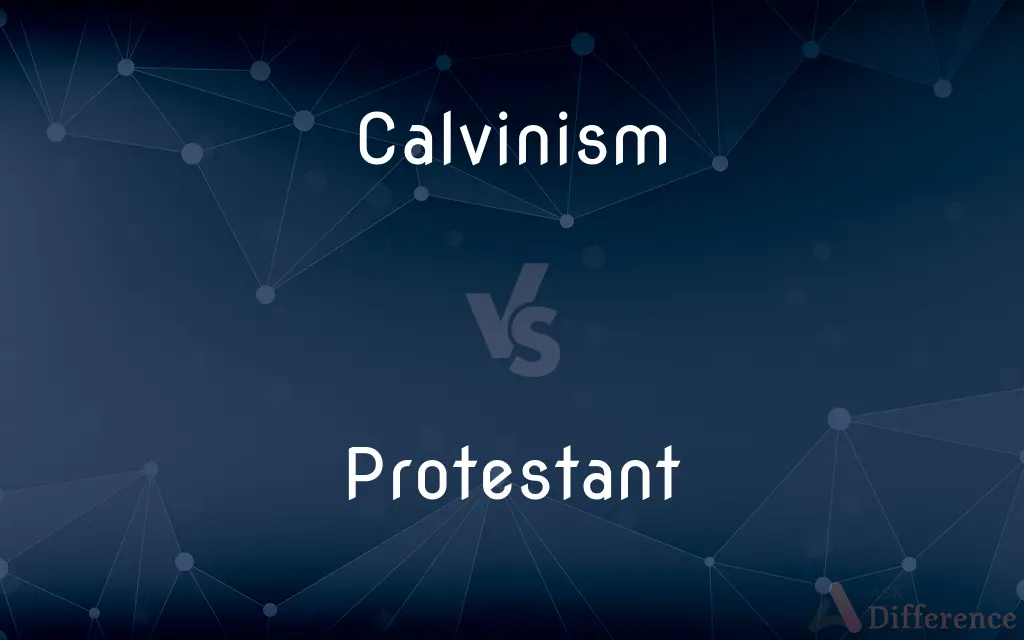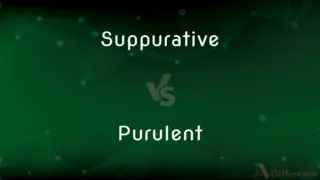Calvinism vs. Protestant — What's the Difference?
Edited by Tayyaba Rehman — By Maham Liaqat — Updated on March 8, 2024
Calvinism is a branch of Protestant Christianity, emphasizing predestination and God's sovereignty, while Protestantism is a broader Christian tradition rejecting Roman Catholic authority.

Difference Between Calvinism and Protestant
Table of Contents
ADVERTISEMENT
Key Differences
Calvinism is a theological framework within Protestant Christianity, founded by John Calvin in the 16th century. It is known for its emphasis on the sovereignty of God, predestination, and the total depravity of man. Whereas Protestantism is a larger Christian tradition that originated in the 16th century with figures like Martin Luther, rejecting the authority of the Pope and various doctrines of the Roman Catholic Church.
One of the key doctrines of Calvinism is predestination, the belief that God has predestined some people for salvation and others for damnation. This contrasts with broader Protestant beliefs, which encompass a range of views on salvation and free will, with many denominations teaching that individuals have a choice in their salvation.
Calvinism is characterized by the Five Points of Calvinism, summarized as TULIP: Total Depravity, Unconditional Election, Limited Atonement, Irresistible Grace, and Perseverance of the Saints. Protestantism, however, encompasses a wide variety of beliefs and practices, not confined to these doctrines.
The spread of Calvinism has been significant in certain regions, including parts of Europe, North America, and South Africa, influencing various Reformed churches. Protestantism, being more encompassing, is spread worldwide, including Lutheranism, Anglicanism, Methodism, and many other denominations.
While Calvinism has had a profound impact on the development of democratic and republican forms of government, particularly in the United States, Protestantism has played a crucial role in shaping modern Western civilization, including its values, culture, and social structures.
ADVERTISEMENT
Comparison Chart
Definition
A branch of Protestant Christianity focusing on predestination and God's sovereignty.
A Christian tradition rejecting Roman Catholic authority and practices.
Key Doctrine
Predestination
Justification by faith alone
Founder
John Calvin
Martin Luther and other reformers
Five Points (TULIP)
Total Depravity, Unconditional Election, Limited Atonement, Irresistible Grace, Perseverance of the Saints
Not applicable; Protestantism encompasses various beliefs.
Influence
Significant in Reformed churches and certain regions
Widespread, with numerous denominations globally
Role in Society
Influential in shaping democratic and republican ideas
Key in shaping Western civilization and values
Compare with Definitions
Calvinism
Central belief that God has predestined individuals for salvation or damnation.
Calvinists believe in unconditional election, where God's grace is given independently of human action.
Protestant
Present worldwide, influencing various cultures and societies.
Protestant missionaries have been active globally for centuries.
Calvinism
A theology emphasizing God's supreme power and predestination.
Calvinism teaches that salvation is predestined for some and not others.
Protestant
Initiated the Reformation, challenging the Catholic Church.
Martin Luther's 95 Theses sparked the Protestant Reformation.
Calvinism
Characterized by the Five Points of Calvinism or TULIP.
The concept of Total Depravity asserts that sin affects all parts of a person.
Protestant
Encompasses a wide range of beliefs and denominations.
Lutheranism, Anglicanism, and Methodism are all Protestant traditions.
Calvinism
Predominant in parts of Europe and North America.
Presbyterianism, a branch of Calvinism, is significant in Scotland and the US.
Protestant
A Christian movement rejecting Roman Catholic doctrine and authority.
Protestants believe in salvation through faith alone, not works.
Calvinism
Strongly influenced Reformed churches and social-political structures.
Calvinist principles contributed to the development of democracy in America.
Protestant
Justification by faith, Scripture as the ultimate authority.
Protestants emphasize reading and interpreting the Bible individually.
Calvinism
Calvinism (also called the Reformed tradition or Reformed Protestantism) is a major branch of Protestantism that follows the theological tradition and forms of Christian practice set down by John Calvin and other Reformation-era theologians. It emphasises the sovereignty of God and the authority of the Bible.
Protestant
A member of a Western Christian church whose faith and practice are founded on the principles of the Reformation, especially in the acceptance of the Bible as the sole source of revelation, in justification by faith alone, and in the universal priesthood of all the believers.
Calvinism
The religious doctrines of John Calvin, emphasizing the omnipotence of God and the salvation of the elect by God's grace alone.
Protestant
Of or relating to Protestants or Protestantism;
Protestant churches
A Protestant denomination
Calvinism
The theological tenets or doctrines of John Calvin (a French theologian and reformer of the 16th century) and his followers, or of the so-called calvinistic churches.
Protestant
A member of a Western Christian church adhering to the theologies of Luther, Calvin, or Zwingli.
Calvinism
The theological system of John Calvin and his followers emphasizing omnipotence of God and salvation by grace alone
Protestant
One of the German princes or cities that supported the doctrines of Luther and protested against the decision of the second Diet of Speyer (1529) to enforce the Edict of Worms (1521) and deny toleration to Lutherans.
Protestant
Protestant (also prə-tĕstənt) One who makes a declaration or avowal.
Protestant
Of or relating to Protestants or Protestantism.
Protestant
Alternative case form of Protestant
A protestant effort
Protestant work ethic
Protestant
Protesting.
Protestant
One who protests; a protester.
Protestant
Alternative case form of Protestant
Protestant
One who protests; - originally applied to those who adhered to Luther, and protested against, or made a solemn declaration of dissent from, a decree of the Emperor Charles V. and the Diet of Spires, in 1529, against the Reformers, and appealed to a general council; - now used in a popular sense to designate any Christian who does not belong to the Roman Catholic or the Greek Church.
Protestant
Making a protest; protesting.
Protestant
Of or pertaining to the faith and practice of those Christians who reject the authority of the Roman Catholic Church; as, Protestant writers.
Protestant
An adherent of Protestantism
Protestant
The Protestant churches and denominations collectively
Protestant
Making a protest
Common Curiosities
What distinguishes Calvinism from other Protestant beliefs?
Calvinism is distinguished by its emphasis on predestination and the sovereignty of God, summarized in the Five Points of Calvinism.
What led to the rise of Protestantism?
Protestantism arose from the Reformation in the 16th century, a movement against perceived errors and abuses in the Roman Catholic Church.
How do Calvinists view salvation?
Calvinists view salvation as predestined by God, where individuals are elected for salvation through God's grace alone, not by their own merits.
Are there Protestant denominations that reject Calvinism?
Yes, many Protestant denominations do not adhere to Calvinist doctrine, including Methodists, Lutherans, and many Anglicans, emphasizing free will and the universal potential for salvation.
What impact did Calvinism have on society?
Calvinism has had a significant impact on the development of democratic and republican ideals, especially in the United States.
What's the global presence of Calvinism compared to Protestantism?
Calvinism has a strong presence in certain regions and countries, while Protestantism, as a broader category, has a global presence with diverse expressions.
Can Calvinists be considered Protestants?
Yes, Calvinists are a subset of Protestants, sharing core Protestant principles while holding to specific doctrinal differences.
How do Calvinists and other Protestants view the church's role?
Calvinists and other Protestants typically view the church as a community of believers gathered for worship, instruction, and fellowship, with some differences in governance and practice.
What role does the Bible play in Protestantism?
In Protestantism, the Bible is the ultimate authority on matters of faith and practice, with individuals encouraged to read and interpret it directly.
Is Calvinism more doctrinally rigid than Protestantism in general?
Calvinism is often considered more doctrinally defined, especially regarding predestination and the sovereignty of God, compared to the wider spectrum of beliefs within Protestantism.
How does Calvinism affect its followers' lives?
Calvinism affects followers' lives by emphasizing living in a manner that reflects the sovereignty of God and the importance of a personal relationship with God, guided by the doctrines of grace.
What are the core values of Protestantism?
Core Protestant values include justification by faith alone, the priesthood of all believers, and the authority of the Scriptures.
How do Calvinist and Protestant views on free will differ?
Calvinism's view on free will is closely tied to predestination and God's sovereignty, while broader Protestantism includes a range of views, often emphasizing human free will in accepting salvation.
What challenges have Calvinism and Protestantism faced?
Both have faced challenges in maintaining doctrinal purity, addressing cultural relevancies, and navigating divisions within and outside their respective movements.
Do Calvinism and Protestantism share any common practices?
Both share common Christian practices such as baptism, communion, and the preaching of the Scriptures, though specific interpretations and implementations may vary.
Share Your Discovery

Previous Comparison
Suppurative vs. Purulent
Next Comparison
Bury vs. DigAuthor Spotlight
Written by
Maham LiaqatEdited by
Tayyaba RehmanTayyaba Rehman is a distinguished writer, currently serving as a primary contributor to askdifference.com. As a researcher in semantics and etymology, Tayyaba's passion for the complexity of languages and their distinctions has found a perfect home on the platform. Tayyaba delves into the intricacies of language, distinguishing between commonly confused words and phrases, thereby providing clarity for readers worldwide.
















































